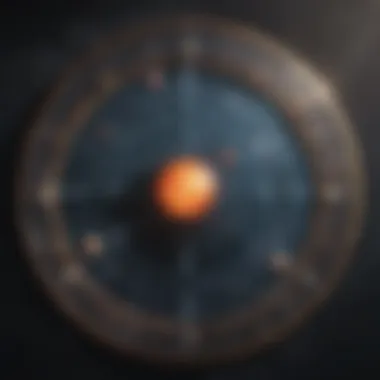Understanding How to Identify Your Zodiac Sign


Intro
Astrology has a long history of mystique and curiosity, often drawing individuals into its cosmic embrace. At its heart lies the zodiac, the twelve signs that serve as celestial markers influencing our character and interactions. Identifying one's zodiac sign goes beyond a mere birth date; it’s a deeper dive into the fabric of personality and potential. Each sign unfolds a unique story, shaped by the alignment of stars and planets at the moment of our birth.
Understanding how to pinpoint your zodiac sign opens the door to not only self-awareness but also enhances relationships and personal development. In this journey through the skies, we will explore the essential factors—birth date, time, and other influences—that collectively tailor our zodiac identity. Armed with practical insights and clarifications, both novices and seasoned stargazers can glean a clearer understanding of their astrological profiles.
"Astrology is a language. If you understand this language, the sky speaks to you."
With this in mind, let’s embark on our quest and break down the key characteristics defining each zodiac sign.
Intro to Zodiac Signs
Zodiac signs are more than just characters from a starry tale; they are crucial to the understanding of astrology. They serve as bridges between the celestial heavens and our earthly experiences. By exploring this topic, one gains insight not only into the foundational aspects of astrology but also into how our zodiac sign can influence personality, behavior, and emotions. Recognizing one's zodiac sign can open a treasure trove of self-awareness and understanding, offering people a cosmic lens through which to view their lives.
The significance of zodiac signs rests heavily upon their historical roots, which weave a narrative that spans across cultures and epochs. The myths, legends, and astrological practices associated with these signs carry profound wisdom. This wisdom aids in self-reflection, helping individuals make sense of their place in the universe and their relationships with others. Major benefits to understanding zodiac signs include:
- Clarity in Self-Identity: Knowing one's sun sign helps individuals grasp core personality traits and motivations.
- Enhanced Relationships: Understanding the zodiac signs of friends or partners allows for greater empathy and insights into interpersonal dynamics.
- Cultural Connection: The shared belief in astrology can create bonds that transcend geographic and cultural boundaries.
As we delve deeper into the historical context and importance of these signs, it becomes clear that identifying one's zodiac sign is merely the beginning of a more expansive journey into astrology itself.
The Historical Context of Astrology
The roots of astrology lay deep in the soil of ancient civilizations. Notably, the Babylonians were among the first to develop and document astrological practices around 2000 BCE. They meticulously observed celestial movements, correlating them with terrestrial events. This practice evolved, spreading to cultures like the Greeks, where influential thinkers such as Ptolemy wrote extensively, framing the astrological structures that we still reference today.
The significance of planetary phenomena was visualized in intricate ways. Constellations, which we associate with zodiac signs, served as more than mere stargazing entertainment; they were considered to house divine messages and cosmic truths. Over time, this historical context grew to encompass various systems, including Vedic astrology from India and the Chinese zodiac. Each system offers unique insights, shaping how followers perceive timing, fate, and personal journeys.
The Importance of Zodiac Signs in Astrology
At the heart of astrology lies the concept of the zodiac, comprising twelve distinct signs, each harboring its own essence. These signs encapsulate character traits, motivations, and reactions of individuals born under their influence. Understanding each sign allows for a nuanced interpretation of human behavior.
Furthermore, the zodiac is not just a mere classification; it is a symbolic reflection of the cosmos’ order. Each sign is connected to specific elements and modalities, contributing to the rich tapestry of astrology. Astrologers utilize this information to craft horoscopes, guiding individuals through life's myriad challenges and opportunities.
"Zodiac signs provide a cosmic map that, when interpreted, can aid in navigating the complexities of the human experience."
In summarizing the role of zodiac signs, it's essential to acknowledge their profound impact on individuals' psychological landscapes and relationships with the world. By continuously examining how these signs interact through their elements and modalities, one gains a deeper understanding, not only of themselves but also of the intricate web of connections shared with others.
Understanding the Astrological Framework
Astrology operates on a complex structure that encompasses many facets of celestial movements and their influences on human life. Within this framework, understanding is essential not just for enthusiasts, but for those who seek to delve into the intricate tapestry of their personal zodiacs. This awareness aids both novices and seasoned practitioners in interpreting astrological charts effectively, allowing them to glean insights about individual personalities, relationships, and life paths.
Astrology, at its core, isn’t merely about knowing one’s zodiac sign. It’s about comprehending how various celestial bodies interact and correspond with earthly experiences. Each component—the signs, houses, planets, and aspects—works in harmony or sometimes discord, shaping individual destinies. Therefore, this foundational understanding is a stepping stone for anyone wishing to explore the depths of their astrological identity.
The Twelve Zodiac Signs Explained
The zodiac comprises twelve distinct signs, each embodying unique characteristics and traits. Aries, with its fiery enthusiasm, contrasts with the earthy practicality of Taurus. These signs are more than just labels; they are a language expressing the nuances of human behavior and emotion. Here’s a brief outline of what each sign symbolizes:
- Aries: The trailblazer with unyielding energy.
- Taurus: A stable force, valuing comfort and reliability.
- Gemini: The curious socialite, adept in communication.
- Cancer: The nurturer, deeply in tune with emotions.
- Leo: The charismatic leader, driven by ambition.
- Virgo: The meticulous analyst, focused on details.
- Libra: The peacemaker, balancing relationships.
- Scorpio: The intense seeker, delving deep into mysteries.
- Sagittarius: The adventurous spirit, yearning for exploration.
- Capricorn: The disciplined architect of ambition.
- Aquarius: The visionary, unbound by tradition.
- Pisces: The empathetic dreamer, connected to intuition.
By recognizing these traits, individuals can better navigate their personal and social landscapes, fostering healthier relationships and deeper self-awareness.
Elements and Modalities in Astrology


Astrology is further segmented into elements and modalities, which play a significant role in defining the nature of each sign. The four elements—Fire, Earth, Air, and Water—represent fundamental qualities:
- Fire signs (Aries, Leo, Sagittarius): Impulsive, passionate, and energetic.
- Earth signs (Taurus, Virgo, Capricorn): Grounded, practical, and dependable.
- Air signs (Gemini, Libra, Aquarius): Intellectual, social, and communicative.
- Water signs (Cancer, Scorpio, Pisces): Emotional, intuitive, and nurturing.
In concert, the three modalities—Cardinal, Fixed, and Mutable—indicate how signs express their energies:
- Cardinal signs (Aries, Cancer, Libra, Capricorn): Initiative and leadership.
- Fixed signs (Taurus, Leo, Scorpio, Aquarius): Stability and determination.
- Mutable signs (Gemini, Virgo, Sagittarius, Pisces): Adaptability and flexibility.
Understanding these dimensions enriches one’s comprehension of astrological influences, providing clarity in interpreting personal charts and compatibility with others.
The Role of the Sun, Moon, and Ascendant
The Sun, Moon, and Ascendant—often referred to as the "big three"—feature prominently in astrology, each representing different aspects of an individual's character. The Sun signifies core identity and personality; it’s how individuals experience life at their core. In contrast, the Moon governs emotions and inner self; it reveals how one reacts to the world emotionally. Lastly, the Ascendant, or rising sign, indicates the outward persona and first impressions people give.
The interplay among these elements can significantly shape one’s astrological profile. For instance, someone with a Taurus Sun, Aries Moon, and Gemini Ascendant may project an assertive and lively image while internally processing emotions more slowly and thoughtfully. Here’s a quick look at their roles:
- Sun Sign: Reflects conscious self and ego.
- Moon Sign: Indicates emotional responses and instincts.
- Ascendant Sign: Dictates the social facade and first interactions.
Recognizing these elements is crucial in navigating one's astrological journey, further constructing a comprehensive self-awareness.
Understanding these frameworks can illuminate a clearer path to interpreting astrological charts and finding personal truths beyond mere zodiac signs.
Identifying Your Zodiac Sign
Identifying one's zodiac sign is not merely an exercise in curiosity but serves as a gateway to understanding oneself on a deeper level. Our zodiac sign forms a tapestry woven from the threads of time, space, and celestial influences, illuminating our character and guiding our choices. Within this section, various elements will be scrutinized to unveil the benefits and considerations pivotal to pinpointing your zodiac sign. The process extends beyond simply knowing which sign aligns with your birthday; it incorporates the intricate web of astrological influences—time, location, and individual circumstances—that contribute to your astrological profile.
Using Date of Birth to Find Your Sign
Your date of birth is the primary key to unlocking your zodiac sign. Each sign correlates with specific date ranges, often delineating distinct personality traits and life paths. For instance, if you were born between March 21 and April 19, you fall under the Aries sign, characterized by initiative and enthusiasm. The significance of this datescale cannot be overstated; not only does it provide a direct route to your sun sign, but it also heralds the entry point into the vast world of astrology.
Many people take comfort in the notion that their zodiac sign influences their disposition and behaviors. Therefore, understanding which sign corresponds with your birth date can shed light on innate tendencies, challenges, and strengths that may guide your life's journey. However, one must be cautious—the date alone can oversimplify a complex array of influences, often demanding further investigation into other factors, such as the time and location of birth.
The Impact of Time and Place of Birth
Time and place of birth are not just footnotes; they play a crucial role in refining the astrological chart. The Earth's rotation and the celestial arrangements at the moment of your birth shape the ascendant and moon sign, which often influence your temperament and emotional responses in significant ways. The uniqueness of each individual lies in this interplay of sun, moon, and rising signs, crafting a comprehensive profile that may reveal far more than just the surface-level characteristics associated with the sun sign alone.
For instance, someone whose sun sign is Leo might exhibit common Leo traits like confidence and leadership, yet if their moon is in Pisces, they may express sensitivity and intuition at odds with the fiery exterior. This interconnectedness encourages deeper inquiry, compelling individuals to explore how their zodiac influences manifest in daily life. Understanding these sub-factors enhances the complexity and richness of one's astrological identity.
Astrological Tools for Identification
Astrological tools are invaluable companions on your journey of zodiac exploration. They provide a structured approach to understanding your sign and help demystify the astrological system.
Astrological Calendars
Astrological calendars are essential resources, offering a detailed overview of the sun's journey through each zodiac sign along with significant lunar phases. This instrument can clarify when each sign is at its peak, guiding individuals better understand the astrological landscape throughout the year. One key characteristic of astrological calendars is their chronological nature, displaying how celestial events and sign transitions influence moods, energies, and interpersonal interactions. Therein lies their popularity; many people find comfort in aligning their activities—be it planting crops, launching projects, or simply navigating daily life—with astrological occurrences.
A unique feature of these calendars is their ability to reveal lesser-known astrological events, like eclipses or retrogrades, providing insights that traditional zodiac profiles may overlook. However, while astrological calendars are insightful tools, they presuppose a certain level of astrological knowledge. For novices, the abundance of information may initially appear overwhelming.
Online Zodiac Calculators
For those who prefer more dynamic approaches, online zodiac calculators offer quick and user-friendly insights into your zodiac profile. These calculators typically require your birth date, time, and location to generate a nuanced astrological profile. A significant characteristic of these calculators is convenience—they allow users to pierce through the complexity of astrological data without hefty investment in astrological literature.


These tools also present a unique benefit in their instant feedback, which can be particularly enticing for those curious about their astrological make-up. However, a notable disadvantage is that their results can sometimes lack the depth and personal touch of a consultation with a professional astrologer. Nuances can become lost behind the algorithmic curtain, leaving users with a one-dimensional perspective on what could be a multifaceted personality.
Zodiac Sign Compatibility
Zodiac sign compatibility is a topic that pulls at the strings of human interaction. For many, understanding which signs mesh well can illuminate the intricacies of relationships, ranging from friendships to romantic entanglements. When diving into compatibility, one quickly realizes it is not merely about which sign coincides with another but rather how they interact within the celestial framework. The implications can be vast, influencing everything from communication styles to emotional needs.
Whether you’re an ardent believer in astrology or a casual observer, the study of these compatibilities serves numerous purposes. It gives individuals insights into inherent traits of each sign and frames how these traits interact with other signs. For example, the fiery passion of a Leo may clash or harmonize with the cool demeanor of a Virgo, depending on their approaches to various aspects of life.
Understanding Interpersonal Dynamics
At the heart of zodiac compatibility lies understanding interpersonal dynamics. Each sign carries distinct traits shaped by the governance of planets and elements. This foundational understanding can elevate our awareness of how we engage with others. Every zodiac sign, whether it’s the ambitious Capricorn or the empathetic Pisces, posses a penchant for certain behaviors and reactions.
- Fire Signs: Aries, Leo, Sagittarius tend to pursue their desires with vigor, often bringing energy to their alliances.
- Earth Signs: Taurus, Virgo, Capricorn ground relationships in practicality, providing stability and security.
- Air Signs: Gemini, Libra, Aquarius promote discourse and social interactions, fostering a sense of community.
- Water Signs: Cancer, Scorpio, Pisces delve into emotional depths, crafting profound connections based on intuition.
For instance, an Aries and a Sagittarius duo can create fiery synergy, thriving in adventures together. However, if emotions run high in a Cancer-Aries pairing, a strategic approach must be taken to navigate potential misunderstandings. So, understanding these unique dynamics can highlight the strengths and weaknesses inherent in any connection.
Synastry: Deeper Compatibility Insights
Delving deeper into compatibility, synastry offers unique insights into how two individuals interact on a celestial level. It’s not just about sun signs; synastry invites us to examine the aspects formed between the two individuals' natal charts. Here, we can witness how planets align, creating either constructive or challenging energies.
"Synastry unveils layers of potential harmony or discord that go beyond surface-level signs."
Consider Moon and Venus placements. The Moon reveals one’s emotional responses, while Venus speaks to affection and attraction. A person with a Venus in Scorpio might be intensely passionate, yet clingy, while a Moon in Aquarius values freedom and individualism. These stark contrasts can either lead to a beautiful dance of compromise or intense friction if not understood adequately.
To explore synastry further, keep these factors in mind:
- Aspects: Square, trine, conjunction — they all depict the nature of interaction.
- Houses: Where one person’s planets fall in another’s chart influences how situations unfold.
- Elemental Coordination: Mixing similar elements could create ease, whereas opposites may compel personal growth.
In sum, zodiac sign compatibility is a rich field of exploration that deepens our understanding of interpersonal relationships. From navigating friendships to seeking romantic partners, being aware of the dynamics at play allows us to foster meaningful connections. With a touch of celestial wisdom, the act of connecting with others transforms into not just instinct, but an informed decision guided by the stars.
The Role of Astrology in Personal Growth
Astrology, often seen as a mystical practice, has roots that extend into the realms of personal development and growth. Understanding one’s zodiac sign can serve as a roadmap for individuals seeking deeper self-awareness and exploration of their potential. It offers a mirror where individuals can reflect on their traits, behaviors, and interpersonal dynamics. When engaged thoughtfully, the insights from astrology can promote positive changes and empower individuals in their personal journeys.
Zodiac Signs and Personality Traits
Each zodiac sign encompasses a unique set of personality traits that can influence how individuals perceive themselves and interact with the world. For example, a Leo, known for its confidence and leadership qualities, may be encouraged to take on more ambitious projects. In contrast, a Piscean, often characterized by empathy and sensitivity, could be guided to harness their emotional depth for nurturing relationships.
It’s paramount to recognize that while these traits offer a lens through which to view oneself, they are not definitive boxes to fit into. Instead, they provide a baseline of characteristics that might resonate with one’s experiences.
One can explore their zodiac sign’s influence by:
- Reflecting on personal experiences: Consider past events that align with your sign's traits.
- Journaling about feelings: Document emotional responses to various situations in life, noting any consistent patterns.
- Discussing with others: Share insights with friends or family who understand astrology, examining how their perceptions match or differ from your self-view.
Understanding these elements can help individuals cultivate their strengths and address weaknesses. Ultimately, embracing these traits can foster a more harmonious relationship with one’s self and others.
Using Astrology for Self-Discovery
Astrology can serve as an invaluable tool for self-discovery, providing key insights that can lead to profound personal development. By examining one’s zodiac sign, individuals can uncover aspects of themselves that may have previously gone unnoticed. For instance, knowing your Sun sign can unveil your core essence, while the Moon sign reflects your emotional self. Each celestial body contributes to a comprehensive understanding of one’s character.
Consider using astrology for self-discovery by:


- Creating a natal chart: This astrological blueprint maps the positions of celestial bodies at your time of birth, revealing significant personality and life themes.
- Engaging in reflective practices: By meditating on the traits associated with your sign, you might discover aspects of your personality that require nurturing or change.
- Learning about transits and progressions: Exploring how the current positions of planets influence your sign can illuminate paths for personal growth.
"Understanding oneself through the lens of astrology can be a transformative experience, leading to greater fulfillment and inner peace."
Astrology doesn’t dictate one’s fate but offers guidance on navigating life's challenges. This nuanced practice encourages individuals to approach life’s complexities with awareness, enabling them to make more informed choices. By using zodiac insights, one can delve deep into a self-exploration journey, cultivating a rich self-awareness that can be both enlightening and empowering.
Incorporating astrology into personal growth strategies can also reveal how one can break unhelpful patterns, often leading to a path where self-acceptance and growth coexist harmoniously. It’s about building a relationship with oneself that's grounded in understanding, rather than judgment.
Addressing Common Misconceptions About Zodiac Signs
Understanding zodiac signs requires more than just a glance at the astrological calendar. Many individuals hold stubborn beliefs about what these signs dictate about personality traits, compatibility, and destiny. By addressing common misconceptions, one can gain a clearer and more nuanced understanding of astrology. This section carefully examines the myths surrounding zodiac signs while underscoring the significance of critical thought and personalized perspectives within astrological interpretations.
Debunking the Myths
There’s a treasure trove of myths lingering around the subject of astrology, clouding perceptions and leading people astray. For instance, some folks maintain that if you are a Capricorn, you must be ambitious and stubborn; however, traits vary widely even within a single sign due to countless factors, including upbringing, environment, and individual choices.
Here’s a rundown of what often gets muddled in the public narrative:
- All Capricorns are ambitious: While many embody determination, others may express their ambition differently or prioritize personal happiness over career.
- Pisces are all dreamers: Sure, some Pisceans dive deep into fantasy, but many are grounded and practical in their approach to life.
- Aquarius lacks emotional depth: This sign may seem aloof, yet their social awareness often stirs deep emotional connections.
- Zodiac signs are deterministic: Just because someone is a certain zodiac sign doesn't lock them into a specific fate; free will remains a prominent factor in personal development.
It's vital to keep an open mind and realize that these stereotypes can cause misunderstandings and might even limit personal growth. Engaging with astrology should not be about fitting into a box, rather exploring the vast human experience through a lens that appreciates complexity.
The Limitations of Sun Sign Astrology
Now, let’s tackle the elephant in the room—sun sign astrology. Plenty of enthusiasts might catch themselves relying solely on their sun sign when interpreting their astrological profile. While the sun sign plays a crucial role in shaping personality, it's comparable to reading only the cover of a book. There’s so much more beneath the surface.
To better illustrate this point:
- Ignoring the Moon and Ascendant: These components are also critical in shaping emotional responses and social behavior. The moon sign often reflects one’s inner self, while the ascendant sign communicates how you present yourself to the world.
- Life Experiences Matter: Personal experiences and choices significantly influence who we are, often overriding astrological traits one might assume based solely on their sun sign.
- Variability in Birth Charts: Each astrological chart is unique due to factors like time and place of birth, creating a brilliant tapestry of influences that go beyond just one sign.
- Multiplicity of Traits: Sun sign astrology tends to oversimplify. People are layered individuals; expecting one sign to define an entire personality is like trying to summarize a multi-faceted character in a single sentence.
The End and Final Thoughts
In wrapping up our exploration into identifying your zodiac sign, it’s clear that this journey is about more than just finding out which symbol corresponds to your birth date. Understanding your zodiac identity serves as a map to help navigate the complexities of personality, relationships, and even life choices.
One critical element is the idea of self-awareness. Recognizing your zodiac sign can offer insights into your own traits, fears, and desires. It creates a framework that helps you understand patterns in your behavior and interactions with others. You might start to notice why you clash with certain signs or why you gel so well with others. This awareness is the starting block for personal growth, potentially leading to healthier relationships and better decision-making.
Another benefit lies in the connections with others. Having a grasp on zodiac compatibilities can enrich your social life. You can engage with friends and family about their signs, fostering conversations that build deeper understanding. This shared interest sometimes acts as a common ground for bonding, encouraging discussions that might have otherwise felt awkward or superficial.
However, it’s essential to approach this topic with a grain of caution. As we’ve discussed, zodiac signs don’t dictate fate. Life is complex, and while astrology can offer guidance, understanding yourself and others requires more than astrological data. Keep that in the back of your mind as you navigate your astrological explorations.
"Astrology is not a science; it’s a language. It tells us what the sky was doing when you were born, and this can offer clues about your personality. But it can't dictate it."
– Unknown
Embracing Your Zodiac Identity
Embracing your zodiac identity is a profound and often transformative experience. Rather than simply seeing it as a fun party trick or a vague guideline, consider it a lens through which you can view your experiences. Acknowledging the nuances of your zodiac sign may help you cultivate empathy towards yourself and others.
Let’s face it, life throws curveballs. Understanding how your sign influences your reactions can aid in navigating those challenges. For instance, a Libra may seek harmony, avoiding confrontation, while a Scorpio might embrace it head-on. Knowing this allows you to anticipate and adjust your approach in various situations.
Moreover, by sharing your zodiac insights with others, you create a space for deeper dialogue. You might drop a hint about your sign during discussions, or even reveal how it shapes your decisions. This sort of openness encourages others to explore their signs as well. Embedded in that exchange is a sense of connection that transcends the ordinary.
The Ongoing Journey of Astrological Exploration
The path of astrological exploration is one that can unfold infinitely. There’s always more to learn and probe. Beyond just knowing your sun sign, venturing into your moon and rising signs could offer a richer understanding. These celestial factors round out your astrological profile, painting a vivid picture of your emotional landscape and outward personality.
As you dig deeper into astrology, the more you might find yourself enamored with the subtleties it brings. Astrology is a tapestry woven of many threads, where every planetary transit and alignment tells a story. Reading about the impact of the current moon phase or the significance of a retrograde can provide you with actionable insights, both day-to-day and long-term.
Your astrological identity isn’t static; it evolves as you do. Keeping up with trends, engaging with communities—like those on Reddit or forums dedicated to astrology—can keep that ongoing journey fresh and stimulating. The beauty of astrology is in its adaptability; it can change with you.







